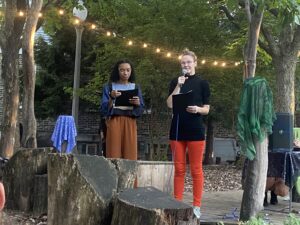Robin Garlish and her family have never been able to freely open their windows in their Pekin, Ill. home. Because of a local power plant, she instead fears heavy air pollutants and the local contaminated water supply for the sake of her children’s health.

“It’s very imbalanced,” said Garlish, a member of the Central Illinois Healthy Community Alliance.
Garlish, whose daughter suffers from chronic asthma attacks, said many families enjoy boating and swimming in their local river, but she worries about the Dynegy power plant nearby. The plant’s ash pit is owned by the company’s Edwards plant, and it lies directly on the river.
Garlish’s public comment was just one story being told at the Feb. 26 public hearing with the Illinois Pollution Control Board in Springfield, Ill.
Ellen Borgia, a resident from Urbana, Ill., has lived in central Illinois for about 30 years, and she has seen firsthand how polluted her limited local water supply can get. She became active in fighting her local power plant Dynegy Vermillian’s coal ash pits in 2003.
“We don’t have any right to leave such a mess for our children,” Borgia said.
Borgia described her local water as having “an orange glow.” The water then flows into three local rivers and a creek.
The Prairie Rivers Network, and other environmental groups, brought residents like Borgia and Garlish to the hearing so the Illinois Environmental Protection Agency could hear how the surrounding communities need a strong regulation. The Illinois EPA submitted a proposal for regulation of coal ash ponds near coal-fire facilities.
“We wanted to make sure the public had a voice,” said Traci Barkley, a water resource scientist for the Prairie Rivers Network.
Barkley said the purpose of the hearing was to find out what the Illinois EPA intends to do with a created rule and how the organization plans to enforce it.
“Most of the removal of these contaminants is difficult,” said Richard Cobb, a geologist and Deputy Manager for the Division of Public Water Supplies for the Illinois EPA. “We would need reverse-osmosis to remove them.”
Cobb was sworn in as a witness for the Illinois EPA, and was questioned by Midwest Generation representatives about various sections of the proposal. Midwest Generation has six power plants throughout Illinois, and has had multiple complaints against them by the Illinois EPA since 2012.
Most complaints said that Midwest Generation Plants were violating groundwater-monitoring standards. According to Cobbs’s pre-filed testimony, most wells near power plants throughout the state had inorganic contaminants, such as arsenic, iron, sulfate, chloride and other elements.
Cobb, and fellow geologist Lynn Dunaway, worked with Midwest Generation’s questions and the concern of several public commenters as to whom would be responsible for paying for cleanups after an ash pit is closed.
“It’s ridiculous that a four-profit entity would be allowed to push off the costs of post-closure care onto citizens in the community,” said Tracy Fox, a member of Peoria Families Against Toxic Waste. “That’s absolutely unacceptable.”
Despite that no official ruling will come from the hearing, both geologists assure the public will not be held financially responsible for post-care cleanup.
“I hope for my children’s sake, and the children of the community’s sake,” said Garlish, who wants strict regulations to be put in place as soon as possible. “I hope it can be a different story for them.”
The Illinois EPA will hold its second set of public hearings in Chicago on May 14 and 15 before taking the next step in making any official legislation.












Be First to Comment